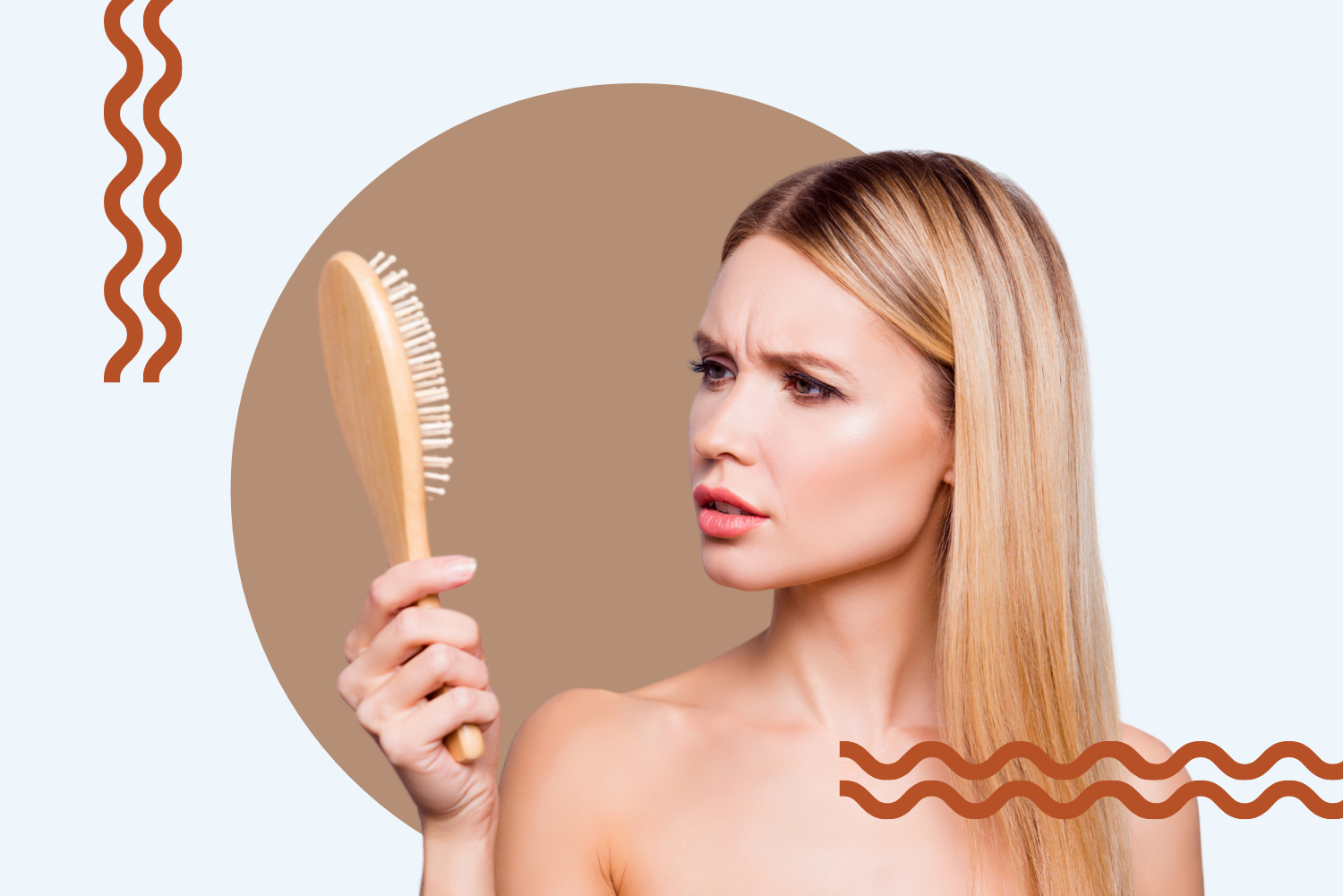
8 Ailments and Illnesses Associated With Hair Loss
Losing small amounts of hair is normal. In fact, as humans we can lose up to 100 hairs a day, often without even realising. However, sudden loss of large amounts of hair can be an indicator of a wider health issue. So can illness cause hair loss? The answer is yes. Keep reading as we have a look at some of the most common illnesses that can cause hair loss.

Alopecia Areata
Alopecia takes different forms. Traction alopecia for example, is caused by constant and excessive tension on the hair (this can be because of tight hairstyling) which can lead to hair loss.
Alopecia areata on the other hand is developed when the immune system attacks hair follicles, resulting in small patches of hair loss. These patches can then 'connect' to make the affected area(s) larger which is most noticeable on the scalp.

Image | Healthline
Anaemia
Iron deficiency anaemia has also been known to contribute to hair loss. In our bodies, iron is responsible for helping to create haemoglobin–the protein within our red blood cells. These red blood cells are then responsible for carrying oxygen around our bodies, and to our tissues to allow them to function correctly.
An iron deficiency diminishes the body's ability to create enough haemoglobin which means less oxygen is available to be carried to your tissues. This forces the body to prioritise carrying the limited oxygen to vital parts of the body, which means sites like the hair follicles receive far less than they need to function correctly which is the cause of the hair loss.
Cancer
For many people, cancer and hair loss go hand in hand. Cancer patients can sometimes experience dramatic hair loss that occurs seemingly overnight with clumps of hair inexplicably falling out. And while many may assume it's just the cancer itself that causes hair loss, it's actually cancer treatments like chemotherapy, radiation therapy and even stem cell transplants.
When it comes to chemotherapy and radiation therapy, these treatments are designed to be aggressive in order to fight the cancer as effectively as possible. Unfortunately while these treatments fight to target the cancer cells, they can also target other cells in the body even if they're working normally. This can include the red blood cells needed to transport oxygen to the hair follicles or the follicles themselves, leading to hair loss.
Does cancer treatment and chemotherapy cause complete hair loss? No. Cancer treatments including chemotherapy can cause hair loss, but sometimes they cause thinning instead. The degree of thinning or hair loss as a result of cancer treatment can depend on a range of factors including: the type of drug used, dosages and a person's sensitivity to the drugs.
Depression
Although not commonly talked about, mental health illnesses such as depression and hair loss can be linked with depression known to cause hair loss in some people. Common symptoms of depression such as a low mood, lethargy and low self-esteem can cause people not to take care of themselves as well as they would without depression.
As this can affect a person's diet and in turn reduce the amount of necessary nutrients needed to support normal bodily functions, it can cause a decline in hair health and make it more brittle.
Dry, brittle hair is more prone to breakage which can lead to thinning and hair loss over time. Similarly, medications used to treat depression can also have side effects that cause hair loss.
Lupus
When it comes to illnesses that can cause hair loss, lupus is one of them. Lupus is a chronic, autoimmune disease that can cause inflammation and pain in the body. As it impacts the immune system, it also attacks healthy tissue including those responsible for hair growth.
While there are four different types of lupus, one well known indicator of lupus is hair loss. One form of hair loss commonly associated with lupus is scarring alopecia, characterised by scarring on the scalp that can lead to permanent hair loss.
Non-scarring alopecia, on the other hand, tends to cause thinning of the hair as opposed to complete hair loss. Caused by the hair growth cycle experiencing periods of dormancy due to the disease, the thinning is usually concentrated at the hairline.
Polycystic Ovary Syndrome
PCOS (Polycystic Ovary Syndrome) is a common illness that affects the function of a person's ovaries. Characterised by irregular periods, high levels of androgen (a male hormone), and enlarged (polycystic) ovaries, symptoms tend to emerge during the late teens or early 20s.
Alongside the aforementioned symptoms, PCOS can also cause thinning hair and hair loss in the form of androgenic alopecia. Androgenic alopecia is a form of hair loss wherein the affected hair becomes thinner, shorter and lighter until production ceases completely.
When it comes to people with PCOS, this hair loss is brought on by the overproduction of androgen–a hormone produced naturally in female and male bodies but when overproduced in a female body, they can lead to blocked hair follicles, resulting in the subsequent hair loss.
Stress
While often overlooked, stress is another health problem that can cause hair loss as people often underestimate the negative effects high levels of stress can have on a person's health. So if you've ever asked yourself: can stress can cause hair loss? The answer is yes.
High stress levels can impair the hair growth cycle as it can push the hair follicles into a state of rest. This causes the hair follicles to then lie dormant before shedding.
Weight Loss
While gradual weight loss is unlikely to cause a negative change to your hair, crash diets, a yo-yo diet and sudden weight loss can cause nutritional deficiencies which can contribute to thinning hair and/or hair loss.
In addition to this, actively trying to lose weight can promote stress in dieters which in turn, can contribute to thinning hair or even hair loss. Similarly, if the weight loss is induced by stress, this can also lead to hair loss.
How can you treat hair loss caused by illness?
Firstly, if you notice that your hair has started thinning or if you've experienced hair loss and suspect that it may be caused by an illness or health problem, it's vital that you consult your physician. Self-diagnosing can do more harm than good as incorrect treatment can potentially worsen the condition and its symptoms.
That said, there are steps you can take to prevent further hair loss if you've suffered thinning or a form of alopecia due to an illness or health problem:
- Follow your doctor's advice–they will know the root cause of your hair loss and allow to take the appropriate measures (e.g. prescribing medication) that can help treat your hair loss without compromising other aspects of your health.
- Keep styling to a minimum–over manipulation can cause stress to the hair and lead to traction alopecia.
- Use gentle hair products–harsh haircare products may worsen any thinning or hair loss so opt for gentler alternatives to current products. You can also consult your physician on planned product changes within your routine to allow them to advise you on suitable products to use.
Wigs And Hair Loss
Hair loss can cause a decline in confidence for many people. Fortunately, wigs are a great way to help those living with different forms of alopecia to help regain some of this confidence. When wearing wigs as a beginner, one of the first questions you ask yourself is: how do I secure my wig without damaging my natural hair?
The Wig Fix by The Renatural is the best way to secure your wig for people with alopecia and hair loss. Made from hypoallergenic, medical-grade silicone, the Wig Fix grips to your wig to keep it secured. It also protects natural hair from further damage and helps to induce hair growth by promoting blood flow making it the best way to secure your wig if you have a form of alopecia.

Have you dealt with hair loss caused by an illness or ailment? Share your experience or questions with us in the comments!




Leave a comment
This site is protected by reCAPTCHA and the Google Privacy Policy and Terms of Service apply.